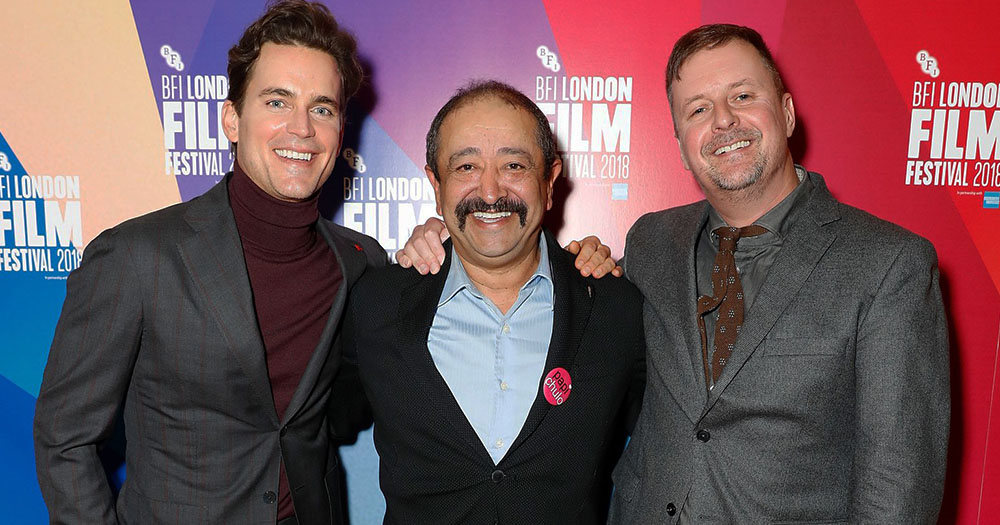John Butler’s new drama/comedy Papi Chulo opens tomorrow. It’s the story of a gay weatherman struggling after the end of a romantic relationship who has a meltdown live on air. Forced to take leave from work, he hires a middle-aged Latino day labourer to do some work around his house. Separated by language, class and sexuality barriers, the pair strike up an unlikely friendship.
Butler’s films have always depicted the friendships between gay and straight men, with previous hits such as The Stag and Handsome Devil for example. But he described how this particular work was also about loss.
“I think you can’t have one without the other, I think if you become attached to anybody on a level there’s always a risk that will go away, so becoming close to people opens you up to that possibility. I think good buddy movies acknowledge that despite the difficulties of being friends, maybe not having them around would be worse.”
https://www.youtube.com/watch?v=xC2mLuHWm7I
It’s the old When Harry Met Sally question. I ask John – can gay and straight men be friends without sex rearing its head?
“I think that rears it head in every single type of friendship, gay, straight, queer. It’s interesting to me to try and find the distinction between platonic friendship and sexual attraction. I don’t think you can fit a piece of paper between those two things in a way. I think attraction is also part of what being friends is. It may only be 10% but it’s always present.”
With his previous two films set in Ireland, did it feel different shooting in LA, especially with a bona-fide star Matt Bomer in the lead?
“It’s the same money, the same schedule, the same problems,” John replies. “International casting and locations make it look different but at heart it’s an Irish funded independent film shot in LA. I think if anything the departure for me is in tone, it’s slightly darker than my previous two films.
“It always amazes me how Spanish California is, it’s incredibly bilingual. It’s an absolute melting pot. I did a lot of research on the guys who stand outside Home Depot (day labourers) from day to day and more often than not they don’t speak English. It’s not metaphorical but it’s an interesting one, because when the two leads talk to each other, there’s no subtitles.”
https://twitter.com/mrjohnbutler/status/1135672160654110720
Is making an LGBT+ film more ‘accessible’ to a straight audience ever an issue that comes up when making work, I ask John.
“I think we’re at an amazing point now in terms of queer representation in film where it’s less of a barrier. I mean, maybe it’s arguable that there is some resistance, but business is by its nature conservative and there’s money involved in film making.
For example, the fact that this has LGBT+ characters makes it difficult to play in certain parts of the world, in certain parts of America. And equally the fact that it’s a story about a migrant worker that doesn’t focus on the misery of the migrant worker experience made it very hard to play in certain parts of America too. People want their gay films to be about the experience of being gay, if the character’s going to be gay they don’t want it to be an incidental part of their overall makeup, they want it to be the story. And if they’re going to an immigrant story they want it to be about the misery of immigration and my response is – ‘Can it not just be a buddy movie’?”
https://twitter.com/mrjohnbutler/status/1136039784172982272
On the other side of the coin, as a gay filmmaker, does John ever feel a responsibility to ensure LGBT+ representation in his movies?
“It’s not a responsibility that’s put on me by other people, it’s a responsibility that I put on myself. When at all possible I want to tell stories of gay representation and I want to be in the mainstream and I don’t want one thing to preclude each other. That’s always been an ambition of mine.
With The Stag, my first film, there were two gay characters. I fought for them to been the film because I wanted some aspect of gay experience to be in this mainstream comedy. I always wanted that, but not out of some sense of crusade, more because I want these films to feel like I’m saying something important about myself.”
Papi Chulo opens in Irish cinemas Friday June 7.
© 2019 GCN (Gay Community News). All rights reserved.
Support GCN
GCN is a free, vital resource for Ireland’s LGBTQ+ community since 1988.
GCN is a trading name of National LGBT Federation CLG, a registered charity - Charity Number: 20034580.
GCN relies on the generous support of the community and allies to sustain the crucial work that we do. Producing GCN is costly, and, in an industry which has been hugely impacted by rising costs, we need your support to help sustain and grow this vital resource.
Supporting GCN for as little as €1.99 per month will help us continue our work as Ireland’s free, independent LGBTQ+ media.
